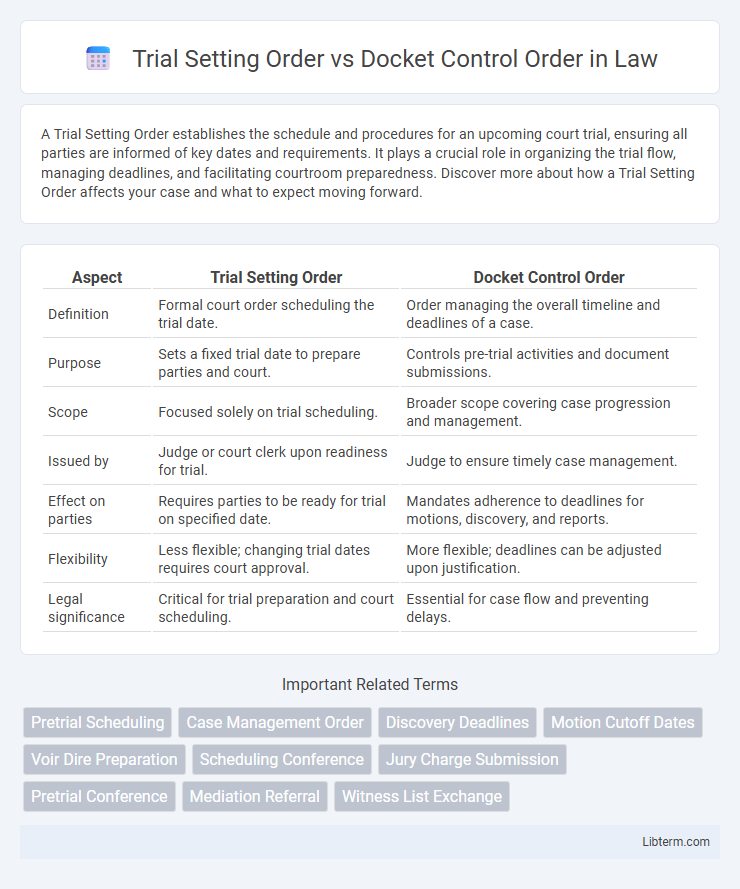A Trial Setting Order establishes the schedule and procedures for an upcoming court trial, ensuring all parties are informed of key dates and requirements. It plays a crucial role in organizing the trial flow, managing deadlines, and facilitating courtroom preparedness. Discover more about how a Trial Setting Order affects your case and what to expect moving forward.
Table of Comparison
| Aspect | Trial Setting Order | Docket Control Order |
|---|---|---|
| Definition | Formal court order scheduling the trial date. | Order managing the overall timeline and deadlines of a case. |
| Purpose | Sets a fixed trial date to prepare parties and court. | Controls pre-trial activities and document submissions. |
| Scope | Focused solely on trial scheduling. | Broader scope covering case progression and management. |
| Issued by | Judge or court clerk upon readiness for trial. | Judge to ensure timely case management. |
| Effect on parties | Requires parties to be ready for trial on specified date. | Mandates adherence to deadlines for motions, discovery, and reports. |
| Flexibility | Less flexible; changing trial dates requires court approval. | More flexible; deadlines can be adjusted upon justification. |
| Legal significance | Critical for trial preparation and court scheduling. | Essential for case flow and preventing delays. |
Introduction to Trial Setting Order and Docket Control Order
Trial Setting Orders establish critical deadlines for trial preparation, including discovery completion and motion filing, ensuring the case progresses efficiently toward trial. Docket Control Orders provide a comprehensive framework for managing the entire litigation timeline by regulating key procedural steps and court appearances. Both orders are essential in maintaining judicial efficiency and preventing delays in civil procedure.
Definitions: Trial Setting Order vs Docket Control Order
A Trial Setting Order is a court directive that schedules the specific date and time for a trial, ensuring all pretrial activities are completed to prepare the case for trial. A Docket Control Order, in contrast, is a broader scheduling tool used by courts to manage the timeline of all case-related events, such as discovery deadlines, motions, and pretrial conferences. Both orders are crucial for maintaining an organized litigation process but serve distinct roles in managing trial preparation and overall case flow.
Purpose and Importance of Each Order
The Trial Setting Order establishes a specific timetable for trial preparation, ensuring all parties complete discovery, motions, and pretrial filings by designated deadlines to facilitate a timely trial date. The Docket Control Order manages the overall progress of a case through the court system by setting crucial deadlines for pleadings, hearings, and case resolutions, helping prevent unnecessary delays and backlog. Both orders are vital for maintaining procedural efficiency and upholding the integrity of the judicial process by providing clear, enforceable timeframes for case management.
Key Differences Between Trial Setting and Docket Control Orders
Trial Setting Orders primarily schedule the specific date and time for a case to go to trial, ensuring all parties are prepared for courtroom proceedings. Docket Control Orders manage the overall timeline of a case by setting deadlines for filing motions, discovery completion, and other pretrial activities. The key difference lies in Trial Setting Orders focusing on trial scheduling, while Docket Control Orders govern the broader case management and procedural timeline.
Roles in Case Management and Litigation Timelines
Trial Setting Orders establish specific deadlines for pre-trial activities and set the date for the trial, providing a clear roadmap for finalizing evidence and motions. Docket Control Orders manage the overall progression of a case by scheduling hearings, discovery periods, and other procedural steps to maintain court efficiency. Together, they streamline case management by balancing detailed timeline control with broader docket organization, reducing delays and promoting timely resolution in litigation.
Impact on Discovery and Pretrial Procedures
A Trial Setting Order establishes firm deadlines for completing discovery and finalizing pretrial motions, ensuring timely preparation for trial. A Docket Control Order allows more judicial discretion by setting broader timeframes for discovery and pretrial activities, promoting flexibility in case management. The Trial Setting Order typically accelerates discovery deadlines, while the Docket Control Order adapts to case complexity, impacting how parties plan and execute discovery and pretrial strategies.
Typical Contents of Trial Setting Order
The Trial Setting Order typically includes the scheduled date for trial, deadlines for filing pre-trial motions, and requirements for pre-trial disclosures. It often mandates the submission of witness lists, exhibit lists, and stipulations to streamline courtroom proceedings. This order plays a key role in ensuring parties adhere to a timeline that facilitates efficient case management before the trial.
Typical Contents of Docket Control Order
A Docket Control Order typically includes deadlines for discovery completion, motions filing, and pre-trial conference dates, ensuring efficient case management. It outlines specific timelines for document exchanges, depositions, and expert witness disclosures to streamline trial preparation. This order helps courts maintain a structured schedule, preventing delays and promoting timely resolution.
Common Challenges and Compliance Issues
Trial Setting Orders often face challenges related to tight deadlines and inadequate preparation time, causing scheduling conflicts and increased motions for continuance. Docket Control Orders frequently encounter compliance issues stemming from rigid timelines and failure to meet discovery obligations, leading to sanctions or case dismissals. Both orders require meticulous adherence to procedural rules to avoid delays, enhance case management, and ensure judicial efficiency.
Selecting the Appropriate Order for Your Case
Selecting the appropriate order between Trial Setting Order and Docket Control Order depends on the case's complexity and court procedures. Trial Setting Orders are often suited for straightforward cases with fixed trial dates, ensuring timely progression and preparation. In contrast, Docket Control Orders provide flexible scheduling and ongoing management, ideal for cases requiring multiple hearings or extensive pretrial activities.
Trial Setting Order Infographic

 libterm.com
libterm.com